
Is This the End of Organic Growth? The Great Organic Traffic Plateau
Written by: Tanya Wigmore
Published: 29 March, 2021
Even if your SEO is working, you may be experiencing a drop in organic traffic. Here's why.
Competition has increased
There are very few barriers to entry to get your site online and as a result, most companies have a website. Some of these will be direct competitors to you for your products and services while others will not be business competitors but WILL be keyword competitors, fighting for search engine positioning for the same keyword phrases.
Year-over-year audience growth has slowed
In previous years, we've seen incredible adoption of internet use and more people using the internet contributes to more potential for website traffic. While those numbers continue to grow, the pace has slowed only because we've hit a pretty impressive adoption rate for internet use and there isn't too much more room here to grow. Even our children have internet access and conduct multiple searches per day when they're on YouTube or asking a home assistant questions.
Google has a monopoly and is increasingly keeping that search traffic to themselves
We work with a lot of clients and look at a lot of traffic source reports. I can tell you that when we look at the organic traffic sources for our clients, organic traffic is primarily coming from Google.
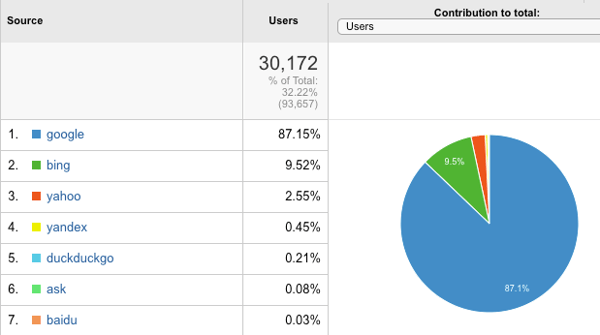
Having Google send almost 90% of your organic traffic isn't a concern when you have that up-and-up traffic pattern. But Google operates on its own agenda and can make changes to their platform at any time. When those changes happen, your traffic will be affected.
In 2020, Two Thirds of Google Searches Ended Without a Click
New data reported by Rand Fishkin of SparkToro shows that from January to December 2020, 64.82% of searches on Google ended in the search results without clicking through to another web property. That's about 2/3 of all Google searches ending as "zero-click searches".
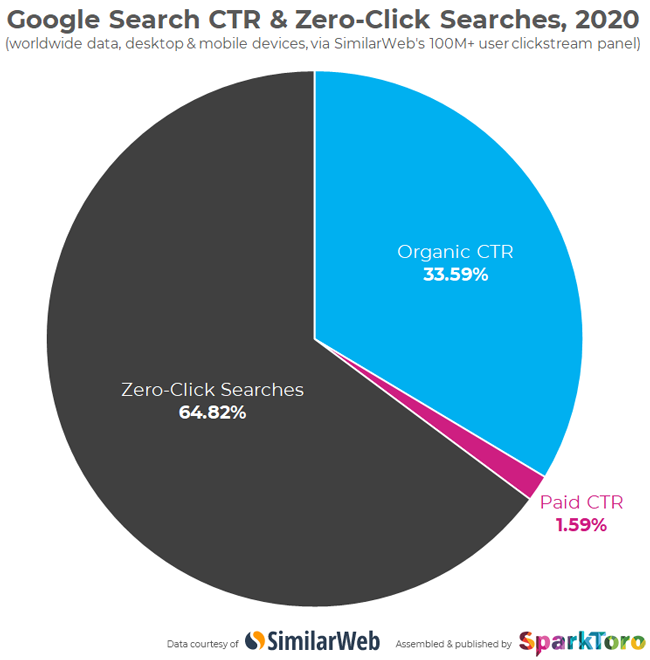
Find this graph and more insightful data over at SparkToro.
When you break it down by device, it's nearly 46% zero-click searches & 51% organic clicks for desktop users and 77% zero-click searches & 22% organic clicks for mobile users. This is HUGE wake up call for many web properties that won't just experience a plateau in traffic but could see a sharp decrease in traffic if some of their top search queries start to result in zero-click searches.
What are Zero-Click Searches?
Google's search volume increased in Q2 2019. Google organic search CTR decreased in Q2 2019. Where are people going if they're not clicking on the search results?
For some searchers, they're not going anywhere. Google's use of in-result answers, knowledge panels and other SERP features make it easy for people to get what they wanted without clicking. These in-search answers and results have been coined "zero-click search results" because Google's provided you the information you were looking for and you don't really need to go to any other web properties.
Google answers all kinds of math and conversion queries directly in the SERP.
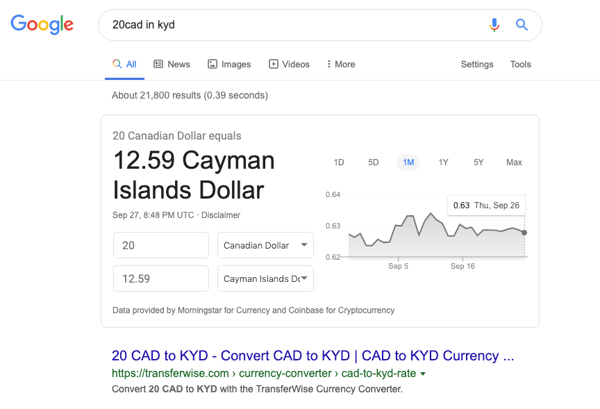
Google will also give you shopping results that go to Google Shopping, flight details on Google Flights, local listings on Google Maps... you get where I'm going with this (I'm going to Google properties, not your site). Google has its own platforms that competes with loads of websites and it should really be no surprise that Google would eventually want to get that traffic.
In 2021 you're not competing with other web properties for search traffic. You're competing with Google.
Increasing Ads CTR
Paid search was a big share gainer in Q2 2019. Google makes money from ads and they want people to click ads. Showing a bunch of ads above the search results is a great way to shift clicks from organic results. On desktop, these ads took the entire space above the fold.

Zero-click searches on Mobile: 2020 vs 2019
On mobile devices where search real estate is even more precious, Google Ads, Google Answers and other content is making a big impact on organic clicks. A joint study by jumpshot & SparkToro found that organic results get clicked on in less than 30% of searches. In 2021, that number decreased to 21.99%.
A look at Mobile CTR for 2018 vs 2016 in the US vs EU+UK

A look at Mobile CTR for 2020.

2019 Traffic Plateau
We really saw this starting back in 2019 with the great traffic plateau. Merkle’s Q2 2019 digital marketing report showed that organic search traffic from Google dropped 8% year/year from Q2 2018 to Q2 2019.
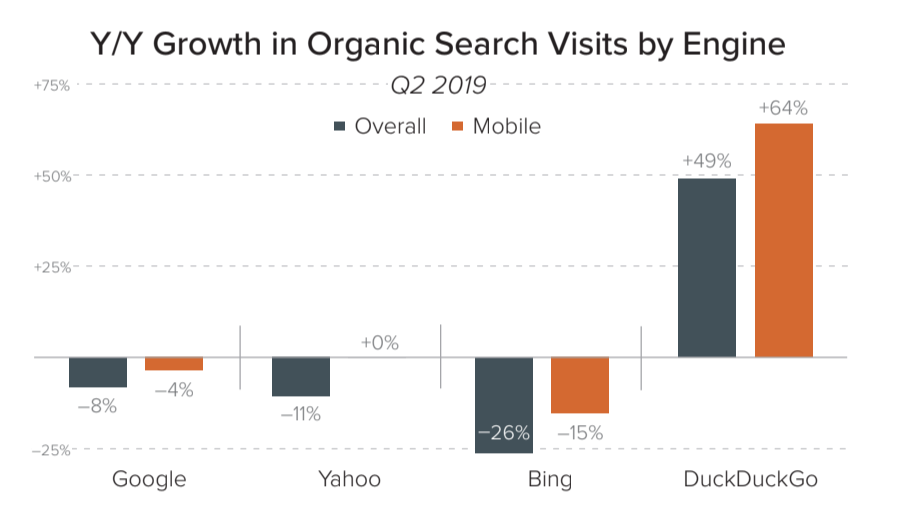
Yahoo and Bing were also sending less traffic to websites, but for most websites this isn't a big deal for your overall website traffic. The only search engine that is sending more traffic to sites is DuckDuckGo.
How can you tell if you're feeling the pinch of zero-click searches or just suck at SEO?
Plateauing or decreasing organic traffic is a huge concern when you're an SEO and organic traffic generation is your job. To assess what's happening with your traffic you'll want to look at a few different KPIs.
- SERP Features
When you have amazing content that ranks really well and gets a featured snippet, you celebrate and panic at the same time. Google decided your content was the best of them all - but now your CTR and traffic to your site is going to drop.

Your SERP Feature is a GOOD thing. SEO is and always has been about your competitive advantage. You are going to miss out from some clicks here but so are your competitors. Your listing has pushed them down even further and you are far more likely to get a click to your site than they are, even if you don't get as many clicks as you used to.
You can track your SERP Feature placements with ahrefs, SEMrush and most other SEO rank tracking tools. Here's what it looks like in ahrefs, the SERP features you have are in blue and the ones that are showing that you aren't in are in grey.
![]()
- Check your leads/sales/other conversion markers.
Decreasing traffic isn't so bad if you're still getting leads and sales. At the end of the day, isn't this a more important metric? For many search results, Google is not sending traffic to your site but they're still facilitating the conversion. Click to call, getting directions, showing your business hours and other contact-type questions can skip the step of coming to your site but still converting with you. This can also happen with things like Google Flights where someone will do their research on Google Flights and then get sent to the main airline to book - it's good for the main airlines but not for the middle-men like Expedia.
- Check Google Search Console
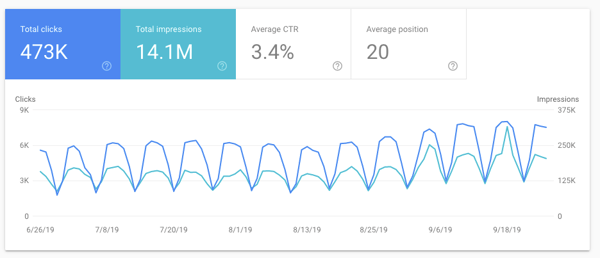
Check to see if your search impressions are increasing. If you're getting more visibility, you're doing something right for SEO. This isn't a great metric to measure 'success' but it is a good way to identify whether or not you have decreasing clicks due to visibility (poor SEO) or due to changes in user behavior or SERP features/ads.
AMP traffic doesn't always show up nice and neat in your Google Analytics account. Decreasing organic traffic is sometimes a symptom of increasing AMP visibility and more people going to non-tracked AMP pages vs your main site pages.
But what if you've capped out? Market maturity and saturation.
If everything has checked out and it looks like you have good visibility, you're outranking the competition, you have strong desktop and mobile presence and you're still seeing a drop in traffic, it's hard not to panic. It's even harder to explain it to your bosses and stakeholders. At a certain point, the best optimized sites are going to hit their market cap. If this is you, congratulations. You've leveled up and have to overcome some new challenges.
- Conversion rate optimization - how can you improve your site to convert more of the people who are coming to it?
- New audience development - what audiences are you missing out on? How can you effectively expand your reach?
- Audience engagement & evangelism - what can you do to get your existing audience to be your hype and sell for you?
If this the end of our organic traffic gold rush?
SEO is about SO much more than just month over month traffic growth. Working with your teams, clients and stakeholders to help clearly identify the main business goals and how you can help the team achieve them is key. Taking the initiative to talk to your team and clients now about how the search landscape is shifting and how KPIs should be adjusted to align with business objectives will help you continue to be a valued asset, and can avoid difficult questions about organic traffic levels down the road.
Note: Not all websites are going to experience a drop in organic traffic and many will continue to see strong month-over-month increases. This is very dependent on your vertical, your competition, and the SERPs for the search phrases that are key to your business.
This article was originally published September 27, 2019 and was lasted updated on March 29, 2021 with new data.

Written by: Tanya Wigmore
Tanya Wigmore is the founder of CRO:NYX Digital and is passionate about growing healthy teams and businesses. With an extensive background in inbound marketing, search marketing, web analytics, CRO & UX, she's always finding new ways to apply optimize and improve.
Solutions
Results
Resources
About
Contact
© CRONYX Digital SEZC
Privacy Policy
|Refund Policy







.png)
.png)
.png)
.png)